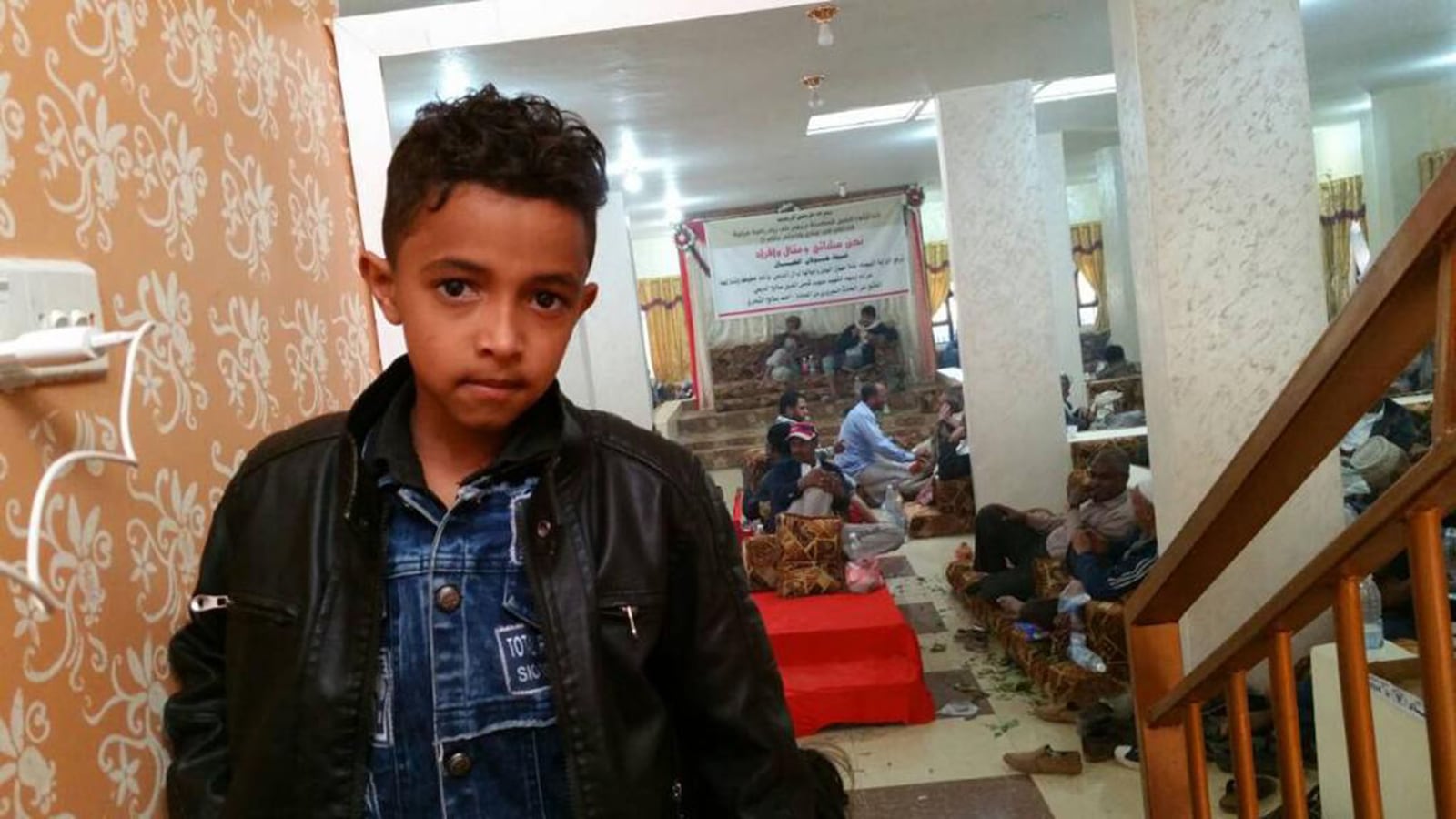Tears glistened on a mother’s cheeks in Brooklyn as she recalled the deafening roar of the warplanes and the jarring explosions of the bombs and the heart-rending screams of her four children, day after night after day after night, in her native Yemen.
“I would calm down one and by the time I got to the next, the first would panic,” she told The Daily Beast in an interview conducted through a translator. “They would pee on themselves. They would cry nonstop.”
Only after her oldest boy developed an infection did she learn that he had been stuffing his ears with napkins in the darkness.
“To stop the noise,” said the mother, who asked that she be identified only by her first initial, D., out of concern for her family’s safety.
She began placing cotton in the boy’s ears as the attacks went on and on. The concussion of the bombs would cause fluid to seep from the ears of the other children.
“The bombs hit really hard,” she noted. “Once it’s very close, it’s even harder.”
The children knew without being told what was happening.
“I didn’t have to explain anything,” D. later told The Daily Beast. “They witnessed everything themselves.”

As the bombs dropped.
Family HandoutThe question was who was doing it, and why. The mother and father learned enough to inform the older ones who was flying the planes and dropping the bombs.
“We’re having a situation in the country,” the mother remembers telling them. “We have these Houthis that are rebels. We have this coalition that is supposed to be helping us, though I don’t know how they are helping us.”
Had she not been seeking to keep it relatively simple for the children, she could have added that the Houthis were Shiites supported by Iran and the coalition was led and directed by Saudi Arabia. Saudi Crown Prince Mohammed bin Salman had launched and directed an air campaign that showed little concern for civilians, including those who, like D. and her family, are Sunnis and not Houthis.
His coalition’s planes struck a wedding and a funeral and a school bus, along with schools and medical facilities, including a cholera treatment center that had shared its exact coordinates with the coalition on 12 occasions before the attack. The planes also blasted marketplaces and densely populated residential areas, killing thousands.
There were “double strikes,” the second of which was apparently meant to kill first responders. Just one group of 60 strikes killed 233 children as counted by an August 2018 United Nations report. Most of the bombs used by the coalition in the attacks are laser-guided, prompting the U.N. report to note, “The use of precision-guided munitions would normally indicate that the object struck was the target.”
The slaughter and Salman's responsibility for it received precious little attention. One journalist who did rise in opposition to the conflict was Washington Post columnist Jamal Khashoggi. He wrote this past Sept.11, on what happened to be the 17th anniversary of 9/11, “The crown prince must bring an end to the violence and restore the dignity of the birthplace of Islam.”
But Mohammed bin Salman's indifference to innocent life aroused widespread outrage only when Khashoggi himself became an example. The killing of thousands of children was just a part of war, but the killing of an American-based journalist was an atrocity mandating sanctions against Saudi Arabia and the crown prince.
President Trump initially cast doubt on reports that Khashoggi had been butchered by a hit team after he entered the Saudi consulate in Istanbul to acquire documents he needed to get married. Trump continued to call Saudi Arabia a “great ally” even after the CIA concluded that MBS had personally ordered the killing. Trump repeatedly noted that sanctions against the Saudis would jeopardize $110 billion in military contracts with American firms. He mentioned in particular Lockheed Martin and Raytheon. Those companies make the precision-guided bombs used in the attacks that came without warning in February 2015 while D.’s family was fast asleep in their home in the capital city of Sana’a.
D. had acquired a green card while spending several years in America and her youngest child was born here. But home is still home, and her husband had secured a job in the Sheraton Hotel in Sana’a and they had settled into a tranquil existence in a safe neighborhood. The children were then aged 1, 4, 6 and 8. The older ones were doing well in school. The biggest trouble at home was to get the kids to come in from playing when they had a big yard and many cousins and friends.
“We were really happy,” D, would recall. “They loved the school. They were very ‘A’ students before the war.
"They were like normal kids. They have friends. They socialize. They loved to play. They had a normal life like any other kids.”
Everything suddenly changed that February night in 2015, when the family awoke to a roaring overhead followed by deafening detonations all around. The whole house shook. Windows shattered.
“In the middle of the night,” D. would recall. “Nobody was prepared. We can hear the planes very close to us. People screaming.”
The attacks continued and the family sought what shelter was afforded by a windowless room on the first floor. They were joined by relatives, including a teenage girl who would run to her mother like a small child when the bombing resumed, calling out, “Can you hide me anywhere?” She soon turned catatonic.
“She would be like staring at the wall for hours, not blinking,” D. recalled.
During lulls in the bombing, the children would venture outside to play while the adults busied themselves with piercing together the necessities of life. The children were always the first to hear the approaching planes and the parents no longer had trouble getting them to come inside.
“Now they just come back home fast,” D. said. “Once they hear the noise of the airplane, they would go back home by themselves. The kids would warn us. So we know about the airplanes from the kids more than ourselves.”
A photo obtained by The Daily Beast shows the children of the extended family during the bombing. They are crouched in what D. calls “duck and cover,” a Yemeni version of what school kids were taught in America during the Cold War.
When there was bombing at night, there was often a pause in the day. One pause ended as the children were on their way to their school and the facility was struck 10 minutes before classes were scheduled to start. D. figures her older children might have been among the dead had they arrived just moments earlier. Numerous students and staff perished.
“Including the doorman,” D. reported.
Also killed was a father and his child of 5 or 6, the two of them having been outside the school, but sucked into the explosion. The bombs had a dynamic that drew everything into the center, rather than just blasting out.
“Nobody was understanding why this was,” D. remembered. “This kind of bomb, when it lands, if you are away from it, it does not push you away, it pulls you in.”
She added, “It creates a huge hole.”

Air strikes have reduced much of Sana’a to rubble.
Khaled Abdullah/REUTERSThe attack on the school prompted a half-hearted apology from the Saudi coalition.
“They made an announcement the next day, ‘Oh, we did it by mistake,’” D. recalled.
The bombing continued as before. The family learned that the Saudis had a name for the initial waves of attacks.
“They call the first attempt to attack the Houthis, ‘The Storm of Ending Everything,’” D. said.
By the third month, there was a new name.
“The Storm of Hope,” she remembered. “They marketed it as, ‘This attack is coming to an end very soon. We can compensate people who have died in this war by mistake. We can compensate people financially and afterwards everything is going to go back to normal. Life will return to normal.’”
She noted, “But that is not what happened.”
The intense bombing went on into 2016 and the family decided it had to escape. They thought of fleeing to a refugee camp in Ethiopia.
“I was scared to go because I learned there is some kind of health issue in that camp and the kids would not make it,” D. told The Daily Beast.
She still had her green card and the youngest child, Hassam, had become an American citizen at birth, but she was unable to obtain visa for her husband and the other children. They reasoned it might be easier to obtain approval if she was in the United States and in 2016 she arrived with the youngest child. Her husband traveled to Egypt with the oldest child, Saleh, and managed to secure a visa at the American consulate.
D. had figured that with a war raging, the American authorities would expedite visas for the remaining two children, 9-year-old Haytham and 7-year-old Suhaib, who had stayed in Yemen in the care of relatives. The approval had still not come when D. learned that Suhaib had been struck and killed in Sana’a by a car while walking to school with his brother Haytham and several cousins.
The brothers had been extraordinarily close and a photo shows them standing back to back in identical brown shoes, black pants and black shirts with embroidered sleeves, but sporting vests just different enough to mark them as individuals. They look like they are ready for anything as long as they have each other.

Haytham with his late brother Suhaib.
Family HandoutAnother photo, this taken at his brother's funeral, shows Haytham with circles under his eyes and and looking as solitary as he could possibly be.
“They were very close,” D. said. “He feels so lonely. He feels alone all the time.”
D. made her way back to Yemen. She had already noticed pronounced changes in Haytham after the bombing began.
“Before the war he [would] take care of his looks all the time, change his clothes, outfit,” she recalled. “He would talk to girls all the time. He was very social. After the war starts, he's not that happy person any more.”
The death of Suhaib had left Haytham hyperactive and in constant need of hugging.
“Even when he sleeps he needs somebody to hug him,” D. said. “He stopped going to school. He’s always scared. He's scared the whole time. And he keeps peeing on himself.”
The 11 year-old was having difficulty adjusting to America, having gone from stuffing his ears with napkin during bombing to negotiating a strange country where he did not speak the language. But the father was there with him.
D.’s big worry was the 4-year-old,who was still not fully verbal, no doubt due to the trauma of the war and constant moving around. He had just begun to make some progress when D. had to return to Yemen.
“He’s still not speaking full sentences like a 4-year-old,” D. said.
D. knew that Hassam needed his mother with him in Brooklyn to continue developing his speech. But then she would look at the once happy Haytham struggling amidst the continuing war in Yemen.
“How I am I going to leave this child?” she would recall asking herself.
She would later tell The Daily Beast, “It was one of the hardest decisions to make. I have to pick and choose between my children.”
In October, she finally decided she had to go back to Hassam and work from Brooklyn to get Haytham’s visa. Her heart broke as she broke the news to Haytham.
“I told him, ‘You will follow me. I’m not leaving you, I’m just going to your brother,’” she recalled.
Before Suhaib was killed, D. would call him and Haytham from Brooklyn two or three times a week. She now calls Haytham daily.
“I don't want to lose him as well,” D. told The Daily Beast. “I just want to make sure he’s there.”
In the meantime, she cannot see toys in a store or go to a Brooklyn park with the 4-year-old without aching for her 9-year-old in Yemen.
“I think about him all the time, she said.
She has been assisted in her ongoing effort to bring Haytham to America by the Brooklyn-based Yemeni America Merchants Association (YAMA), where Abeer Alharazi is director of outreach and merchants services. Alharazi previously worked at the U.S. Embassy in Yemen and since arriving in America has worked tirelessly to assist those in need of immigration guidance. She translated as D. told her story to The Daily Beast at the YAMA office on Fifth Avenue in Brooklyn.
D. was joined by a sister, who asks to be identified only as S.K., who has a husband and four children still in Yemen, including the teenage girl who was so shaken by the bombing that she just sat staring at the wall, unblinking.
The two mothers told of another mother in Yemen who had sought to shelter her children with her body.
“They found her in pieces,” D. sad. “Only her hands remained.”
There had also been a father who had returned from the mosque to find his home demolished and his entire family dead. The same had happened to a father who left home for just a few moments to get food.
“Five minutes,” D. said.
And now, even as outrage mounted over the killing of Khashoggi, the crown prince was intensifying the bombing in Yemen. Trump was being widely criticized for persisting in calling the Saudi’s great allies, but the objections largely had to do with the killing of a journalist than the continued killing of children.
Both mothers in Brooklyn were in tears as they looked at family photos on their cell phones and spoke of their children and a once happy existence that war had turned into an unceasing nightmare.
“I am still in disbelief,” D. told The Daily Beast. “Have to process this every day. I always think about my life before and after.”
She the spoke of her present existence three years after the bombing started without warning in the middle of the night.
“I think we’re dead,” she said.







